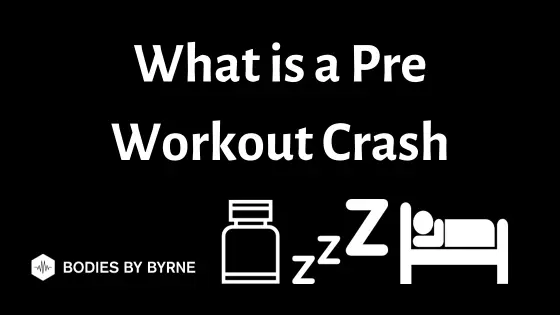When it comes to achieving fitness goals, many people use pre-workout supplements to help boost their energy levels and enhance their performance during a workout.
Whilst pre-workouts are popular, there’s a common phenomenon associated with these supplements known as ‘pre-workout crash’.
Pre-workout crash is a term used to refer to a sudden drop in energy levels and feeling of exhaustion after the initial surge of energy pre-workout gives.
This crash can have a negative impact on both physical and mental performance.
However, pre-workout crashes can be avoided by using pre-workout supplements that contain low doses of caffeine and artificial sweeteners.
As I’ll discuss further, having a balanced diet and staying hydrated are also important for preventing a crash.
In this article, I’ve covered:
– What is a pre-workout crash
– How to avoid pre-workout crashes
– Duration of a pre-workout crash
What Is a Pre-Workout Crash?
A pre-workout crash refers to a sudden energy drop that occurs after the initial spike in energy and focus experienced after consuming pre-workout supplements.
This crash can manifest as fatigue, irritability, and dizziness, which hinder people’s ability to perform optimally during workouts.
Related – Other pre-workout side effects
A pre-workout crash is often linked to the ingredients present in these supplements, which can stimulate the central nervous system and provide a short-term boost but may lead to an inevitable energy decline.
Many pre-workout supplements contain high levels of caffeine which are the stimulant-based pre-workouts.
The dosage can range from anywhere between 40 to 400 milligrams, with some pre-workout supplements containing even more.
Caffeine is used as it can increase alertness and focus by stimulating the central nervous system.
Whilst caffeine can provide an initial energy boost, as it wears off people can experience a sharp crash in their energy level leading to feelings of fatigue.
Some pre-workout supplements also contain artificial sweeteners and additives.
These are typically used to make pre-workout products taste better. However, the downside is that they cause a spike in blood sugar levels.
See also – Why pre-workouts taste bad
After blood sugar levels spike, they rapidly decline resulting in a crash.
As with caffeine crash, this can lead to feelings of fatigue and low energy, as well as cravings for sugary foods.
Pre-workout supplements also often lack a balance of essential nutrients required for sustained energy levels, leading to a rapid depletion of energy stores.
Whilst it’s natural for energy levels to vary throughout the day, a balanced diet is needed to support healthy energy levels.
Fats and carbs are broken down in the body to create different energy systems and provide different energy sources.
Given that pre-workout supplements lack many essential nutrients, they don’t support healthy or sustainable energy levels.
Another potential reason for a pre-workout crash is adrenal fatigue.
The adrenal glands are small glands found on top of both kidneys that work to help regulate the metabolism (energy levels), as well as other things like the immune system.
Prolonged use of high-stimulant pre-workout supplements can overstimulate the adrenal glands, leading to adrenal fatigue and a subsequent crash in energy levels.
Now that I’ve gone through the causes of a pre-workout crash, let’s consider how it can be avoided.
How to Avoid Pre-Workout Crash
A pre-workout crash can negatively affect both mental and physical performance during a workout. This is obviously the opposite of what we want to happen when taking a pre-workout.
It can also make people feel fatigued, dizzy, and irritable so you will not be having a good time or workout if you’re suffering from a pre-workout crash.
For these reasons, it’s best to take steps and precautions to avoid a pre-workout crash completely.
There are a range of ways to avoid a pre-workout crash.
1) Check the Caffeine and Sugar Content
Before buying a pre-workout supplement, people should check the label and carefully examine the ingredients it contains.
It’s important to avoid pre-workouts that have excessive doses of caffeine or artificial sweeteners that could contribute towards a crash.
Instead, pre-workouts that contain lower doses of caffeine and artificial sweeteners should be used.
Pre-workouts that are caffeine and artificial sweetener free may also be more suitable.
For example, instead of using caffeine as a stimulant, some pre-workout products use natural ingredients that help to boost energy levels.
2) Follow Recommended Doses
Pre-workout products will often come with guidance for how much of the product people should use. However, it’s not uncommon for people to increase the dose and take too much pre-workout.
For example, if people already feel tired they might have a higher dose to increase the amount of caffeine they’re consuming.
However, this increase is more likely to cause a crash, as well as other issues like becoming desensitized to caffeine.
3) Consider Natural Ingredients
Choose supplements that contain natural ingredients like beetroot, citrulline, or BCAAs (branched-chain amino acids) to promote sustained energy without the risk of a crash.
Unline ingredients like caffeine and artificial sweeteners, these ingredients promote a longer term increase in energy that wears off more slowly.
4) Get Enough Nutrients

Having a balanced diet that includes complex carbohydrates, lean proteins, and healthy fats to maintain stable energy levels before and after workouts.
When people have nutritional deficiencies they can experience symptoms like fatigue and low energy levels. They’re also going to be more sensitive to pre-workout crashes.
5) Stay Hydrated

Drink sufficient water before and during workouts to prevent dehydration, as proper hydration plays a crucial role in sustaining energy levels and preventing crashes.
The daily recommended intake of water is around 2-3 liters, but it’s important to replenish lost liquids when doing intense workouts.
6) Cycling Supplements
Lastly, consider cycling pre-workout use.
Avoid continuous and long-term use of pre-workout supplements to prevent the development of tolerance and potential adrenal fatigue.
Instead, cycle their usage to allow the body to reset and reduce the risk of crashes.
Related – Pre-workout no longer working
Duration of a Pre-Workout Crash
The duration of a pre-workout crash can vary depending on a few different factors, including the specific supplement used, its dosage, a person’s tolerance level, and their overall health status.
While some people may only experience a brief crash lasting an hour, others might endure its effects for a more extended period depending on how long the pre-workout stays in your system.
The intensity and duration of a pre-workout crash can be influenced by the following factors:
Firstly, the ingredients and their dosage.
The type and quantity of stimulants and other ingredients in the pre-workout supplement play a significant role.
Higher doses of stimulants, such as caffeine, can lead to a more pronounced crash that might last longer than usual.
Secondly, individual tolerance plays a big role. Each person’s tolerance to stimulants and other supplement components can vary.
Individuals who are more sensitive to these substances might experience a crash that lasts longer than those with higher tolerance levels.
People’s metabolic rates also vary.
The body’s metabolism rate affects how quickly it processes the supplement’s components.
A faster metabolism can lead to a shorter crash duration, while a slower metabolism might prolong the effects of the crash.
Thirdly, hydration and nutrition status also have an impact.
Dehydration or inadequate nutrient intake can exacerbate the effects of a pre-workout crash, potentially prolonging its duration.
Proper hydration and balanced nutrition can help mitigate these effects and shorten the crash duration.
Typically, the initial intense effects of the crash may last for a few hours, during which individuals might feel fatigued, irritable, or experience a notable decline in energy levels.
However, the residual effects, such as lingering fatigue and mental fogginess, can persist for a longer duration, possibly extending into the next day in some cases.
Overall
While pre-workout supplements can be beneficial for enhancing performance, it’s essential to be mindful of their potential side effects, such as the pre-workout crash.
By understanding the causes and implementing the suggested strategies to avoid this crash, people can maintain consistent energy levels and optimize their workout routines without compromising their overall well-being.
In general, pre-workouts can be quite tricky to ‘get right’ when supplementing them so check out some of my other articles to make your pre-workout supplementation more effective:
